The car seat and accessory market is projected to expand from USD 5.50 billion in 2025 to USD 9.32 billion by 2035, growing at a CAGR of 5.4%. This growth is being driven by evolving consumer expectations regarding in-vehicle safety, comfort, and personalization. Rising disposable incomes and stricter child safety regulations are promoting the adoption of advanced child car seats featuring side-impact protection and ISOFIX compatibility.
Simultaneously, demand for comfort-enhancing features such as ventilated, massaging, and multi-adjustable seats is increasing across mid-range and luxury vehicles alike. The shift toward viewing car interiors as wellness spaces has been further accelerated post-pandemic, as consumers now prioritize their holistic well-being during travel.
In response, manufacturers are focusing on materials and technologies that elevate both aesthetics and user experience. Premium fabrics, vegan leather, and advanced foams are being employed to ensure both durability and comfort. Features such as heated and ventilated seats and electronically adjustable settings are no longer limited to premium models and are being integrated into a wider array of vehicle segments.
The accessories segment is witnessing robust growth as well, with seat covers, organizers, and lumbar supports being increasingly adopted. Offline channels are expected to remain dominant in 2025, as consumers prefer tactile product assessment. However, online platforms are witnessing rapid growth, offering extensive customization and niche options that appeal to modern buyers.
Future market dynamics will be influenced by trends in vehicle electrification and autonomous driving, where cabin design will place even greater emphasis on comfort and well-being. Intelligent seating solutions equipped with biometric sensors and adaptive controls are being introduced.
Olaf Biedermann, Director of Innovation at Faurecia Automotive, noted: “What we basically do is to monitor respiration rate and heart rate in the seat, and we derive stress and energy levels from that. In case you are stressed, you get a relaxation massage. In case you have low energy levels, you get a very energizing massage.”
This innovation highlights how seating is being transformed into an active wellness solution. Over the next decade, a convergence of safety, comfort, and intelligent design is expected to redefine the role of car seats and accessories in delivering personalized and immersive driving experiences.
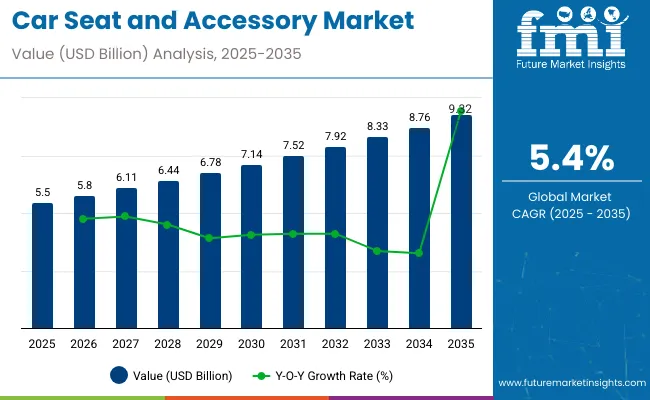
| Attributes | Key Insights |
|---|---|
| Market Size (2025) | USD 5.50 billion |
| Market Size (2035) | USD 9.32 billion |
| CAGR (2025 to 2035) | 5.4% |
Per capita spending on car seats and related accessories is driven by automotive ownership rates, rising awareness of passenger safety, and consumer demand for comfort and customization. The market benefits from increasing disposable incomes, government safety regulations, and a growing focus on ergonomic and smart interior upgrades.
As vehicles evolve toward greater connectivity and automation, leading companies in the car accessories market are integrating smart technologies such as IoT, AI, voice control, and mobile integration. These innovations enhance driver comfort, safety, and overall vehicle functionality.
The below table presents the expected CAGR for the car seat and accessory industry over semi-annual periods spanning from 2025 to 2035.
| Particular | Value CAGR |
|---|---|
| H1 (2025 to 2035) | 4.5% |
| H2 (2025 to 2035) | 6.2% |
| H1 (2025 to 2035) | 6.6% |
| H2 (2025 to 2035) | 4.3% |
The CAGR exhibits a fluctuating trend, initially increasing by 45 BPS from H1 (2024 to 2034) to H2 (2024 to 2034), indicating stronger growth momentum in the latter half. However, a slight increase of 66 BPS in H1 (2025 to 2035) suggests temporary market stabilization or external constraints. Growth rebounds in H2 (2025 to 2035) with a 43 BPS decrease, reflecting renewed demand or industry expansion. This pattern suggests cyclical variations, with stronger growth in the second half of each period, possibly driven by evolving market conditions and strategic investments.
The car seat and accessory market is evolving rapidly, supported by technological advancements and changing consumer lifestyles. Convertible car seats are leading product demand, while online retail channels are emerging as the dominant sales pathway. Enhanced safety features, eco-friendly materials, and consumer convenience are driving strong investments across these segments.
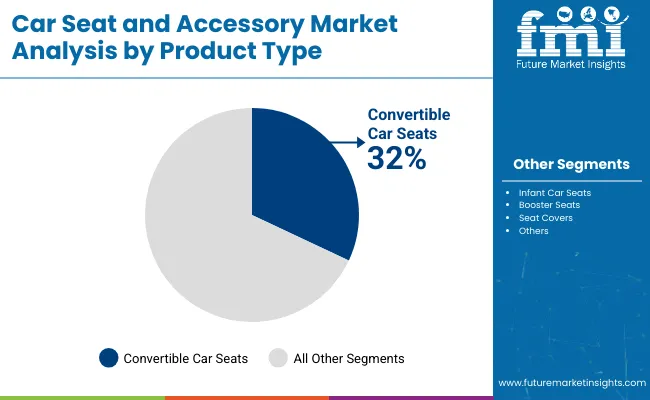
Convertible car seats are projected to dominate the car seat and accessory market by product type, registering a CAGR of 5.7% between 2025 and 2035. Their popularity is being fueled by the growing need for space-efficient and versatile seating solutions, particularly in small households and rental vehicles. Leading brands such as Britax, Graco, and Chicco have launched convertible models featuring adaptable designs that support both rear-facing and forward-facing positions.
This flexibility appeals strongly to modern consumers seeking long-term value and safety. Moreover, compact plug-and-play designs requiring minimal installation are now being prioritized. Manufacturers like Evenflo and Nuna have introduced smart convertible seats incorporating features such as Bluetooth connectivity, automatic reclining adjustments, and integrated safety alerts.
The demand for eco-friendly and sustainably sourced materials is also influencing product innovation, with companies adopting recyclable fabrics and low-emission manufacturing processes. Rising awareness of child safety regulations, coupled with the convenience offered by convertible seats, ensures that this segment will continue leading market growth through 2035.
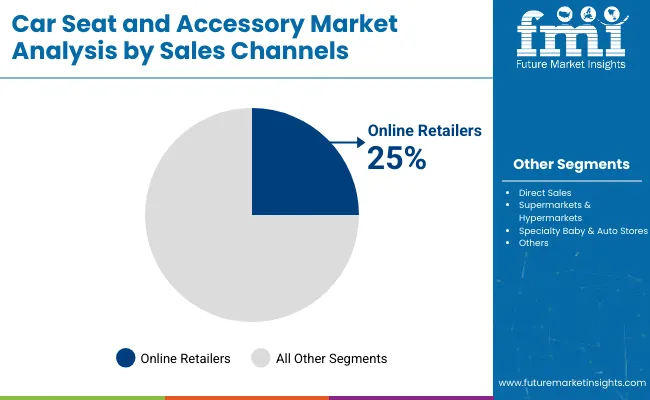
The online retail channel is poised to dominate the sales of car seats and accessories, expanding at a CAGR of 6.2% from 2025 to 2035. The segment’s growth has been propelled by the convenience of home delivery, virtual installation guides, and broad product availability. Leading brands such as UPPAbaby, Diono, and Recaro have strengthened their presence on major e-commerce platforms like Amazon, Walmart.com, and Alibaba.
Consumers are increasingly relying on customer reviews, flexible payment options, and personalized recommendations, making online shopping an attractive option. Manufacturers are also pivoting toward direct-to-consumer (D2C) models, with brands like Clek and Cybex offering exclusive online bundles, extended warranties, and dedicated customer support through their own websites.
Partnerships between key industry players and e-commerce giants have enhanced product visibility, making it easier for consumers to explore and purchase premium models. The online channel’s agility and consumer-centric approach are expected to drive sustained growth across global markets.
The global car seat and accessory market is experiencing significant growth rapidly nowadays because of the rising demand for safety-enhancing comfort solutions daily. Modern urban drivers prefer sleek seats that fit snugly into compact vehicles in densely populated city settings. Luxury product consumers lean heavily toward sleek car seats featuring advanced safety systems and superior adjustability.
Manufacturers respond with sleek, multifunctional designs, enhancing convenience beneath remarkably high standards of safety performance somehow. Sustainable seats are gaining popularity and rapidly accelerating market growth due to low environmental impact and reduced material waste. Digital platforms offer augmented reality previews with personalized recommendations that boost buying experiences significantly, driving sales upward rapidly online.
Sustainability efforts coupled with safety need fuel demand for extremely eco-friendly car seat units daily. Eco-conscious shoppers perceive sustainable seats as savvy financial moves that lower costs beneath sprawling environmental programs. Globally, governments promote safety-certified seats, which significantly influences daily consumer buying habits.
Manufacturers integrate fairly sophisticated materials, low-impact technology, and pretty enhanced safety mechanisms that appeal directly to environmentally conscious consumers. Sophisticated monitoring systems coupled with ergonomic designs somehow become major distinguishing factors. Eco-friendly seats will probably thrust market growth upward fairly rapidly over the next few years.
Rising Focus on Convenience and Flexibility Drives Demand for Car Seats Drivers now prioritize flexibility in seats, driving adoption of super compact designs with ease of use and mobility. Unlike fixed seating, these units offer easy installation mobility and compatibility with multiple vehicle layouts, making them attractive for families.
Innovations like adjustable bases and foldable frames enhance product versatility in multiple ways, catering directly to diverse consumer needs. Family travel trends accelerate market growth rapidly in urban areas as consumers opt for safety-efficient travel solutions daily.
Digital platforms transform the car seat market with seamless access via various online tools and expert reviews readily available everywhere now. Digital stores provide numerous models at fixed prices with flexible payment plans making fancy seats pretty affordable overall nowadays. Virtual product demos boost online shopping with AR-based seat previews and AI-driven personalized recommendations.
Social media significantly impacts consumer behavior through highly targeted digital marketing campaigns and effective influencer partnerships boosting sales online steadily. Doorstep delivery convenience and easy return policies will likely keep fueling e-commerce growth rapidly in car seat market segments overall.
Tier-1 players dominate the global car seat and accessory market, holding a 35-40% share. These firms capitalize on cutting-edge production methods strong brand recognition and sprawling international networks maintain dominance. They prioritize novelty offering smart-enabled safety-efficient seats with cutting-edge features like AI-driven adjustments and IoT connectivity somehow seamlessly. These brands cater to premium consumers who seek high-performance, durable seats. Notable Tier-1 players include Graco, Britax, Diono, and Evenflo.
Tier-2 companies account for 30-35% of the market and primarily serve mid-range consumers seeking reliable and affordable seating solutions. These firms prioritize efficiency by incorporating safety modes and compact designs in products suited for densely populated city dwellings. They focus heavily on regional market expansion via partnerships with various retailers and numerous e-commerce platforms. Notable Tier-2 players include Chicco, Cybex, Maxi-Cosi, and Safety 1st.
Tier-3 players operate in niche and budget-friendly segments, holding a 15-20% market share. They focus on compact low-cost seats designed specifically for tiny urban vehicles and frugal buyers. These brands fiercely compete on price offering basic models with remarkably simple functionalities amidst decent overall quality levels. Notable Tier-3 players include Cosco, BubbleBum, Harmony, and various private-label brands on online marketplaces.
| Country | United States |
|---|---|
| Population (millions) | 345.4 |
| Estimated Per Capita Spending (USD) | 4.60 |
| Country | Germany |
|---|---|
| Population (millions) | 84.3 |
| Estimated Per Capita Spending (USD) | 3.75 |
| Country | Japan |
|---|---|
| Population (millions) | 123.2 |
| Estimated Per Capita Spending (USD) | 5.90 |
| Country | France |
|---|---|
| Population (millions) | 68.2 |
| Estimated Per Capita Spending (USD) | 7.60 |
| Country | United Kingdom |
|---|---|
| Population (millions) | 67.4 |
| Estimated Per Capita Spending (USD) | 5.50 |
The USA car seat market, valued at USD 1,277.8 million, is driven by high consumer spending on auto accessories, increasing preference for smart and safety-efficient seats, and a strong family and rental market. Urban consumers often favor compact seats with sleek designs but premium buyers prefer app-enabled models featuring safety alerts.
Germany’s car seat market valued at USD 415.5 million benefits greatly from strong sustainable practices and safety habits. Eco-conscious consumers largely drive innovation in recyclable car seats through preference for safety-efficient gear. Compact models gain popularity amidst urban travel trends and space constraints found in many vehicles.
Japan’s car seat market valued at USD 275.7 million thrives heavily on cutting-edge high-tech innovation alongside super compact travel solutions. Many vehicles have small interior spaces so demand remains high for slim profile seats. Japanese consumers favor seats with sleek designs and numerous features that seamlessly blend into modern vehicle spaces quietly.
France’s car seat market valued at USD 208.7 million gets shaped by urbanization rising rapidly amidst growing single-parent households and a huge preference for smart seats. French consumers love ultra-sleek seats beautifully integrated into modern vehicles. Market insiders notice surprisingly robust interest in modular seats and those that fold up neatly inside small cars.
The UK car seat market is valued at USD 299.8 million driven largely by the mounting adoption of smart accessories alongside rental market fluctuations. Demand for safety-efficient plug-and-play seats increases rapidly in densely populated urban areas with smaller vehicles. Consumers prefer remarkably silent seats featuring adaptable designs and flexible safety capabilities to suit various needs.
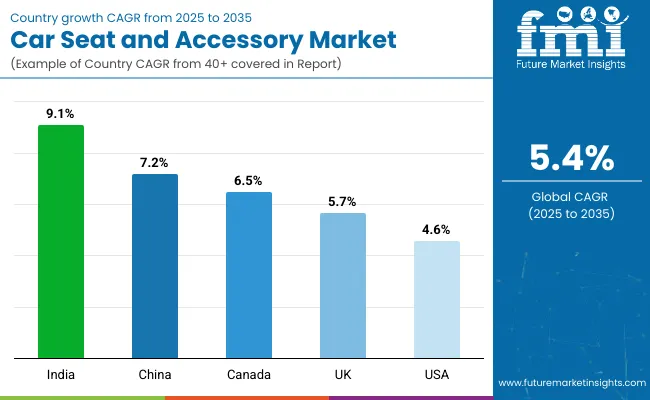
| Country | CAGR (2025 to 2035) |
|---|---|
| USA | 4.6% |
| Canada | 6.5% |
| UK | 5.7% |
| China | 7.2% |
| India | 9.1% |
The USA car seat market will likely experience rapid growth at 4.6% CAGR from 2025 driven by soaring demand for safety-efficient gear. Urbanization fuels demand for tiny vehicles so car seats become super desirable in smaller rentals nowadays.
Consumers prioritize safety efficiency and waste reduction amidst government efforts promoting eco-friendly accessories somehow. Smart tech significantly impacts buying decisions as app-connected safety-tracked seats gain popularity very rapidly online. Strong online retail platforms significantly boost market growth by facilitating consumer comparisons of features and providing easy access nearby.
The UK car seat market will likely expand rapidly at a CAGR of 5.7% over next decade driven by eco-conscious consumers. Manufacturers introduce low-impact accessory models amidst rising concerns regarding waste reduction and safety efficiency requirements.
Rental vehicle increase likewise fuels demand since tenants generally prefer portable accessories that facilitate easy relocation somehow. Younger buyers seek space-saving solutions with modular foldable seats rapidly gaining traction in today's fast-paced lifestyle somehow. E-commerce players offer at-home trials and flexible financing options for buyers through various online platforms nowadays.
India’s car seat market is set to grow at an impressive CAGR of 9.1% from 2025 to 2035, fueled by rapid urbanization, an expanding middle class, and increasing adoption of modern auto accessories. Nuclear families rising alongside disposable incomes drive demand for convenient seating solutions that don’t need dedicated space.
Growing awareness of safety and comfort gizmos fuels emergence of car seats as preferred alternative in urban hubs. E-commerce boom has made these accessories extremely accessible through leading platforms offering enormous discounts under easy EMI options and doorstep services. Global brands eye Indian market introducing super compact seat models suited perfectly for local driving habits daily.
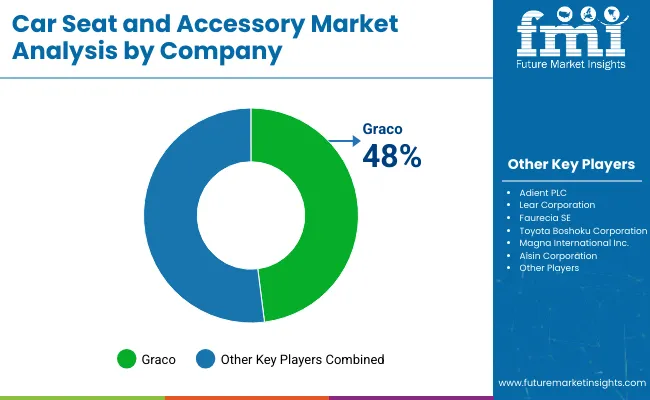
The global car seat and accessory market is highly competitive, with key players such as Graco, Britax, Diono, Evenflo, and Chicco dominating the industry through innovation, safety efficiency, and advanced technology integration. Graco is a leading brand recognized for its quiet operation and cutting-edge safety-efficient seats, particularly its 4Ever technology, which enhances versatility and reduces adjustments. Britax stands out with its smart seat features, including sensor-based safety cycles and app connectivity, catering to tech-savvy consumers looking for convenience.
Apart from these major brands, emerging players like Cosco and BubbleBum are redefining the market with affordable and space-saving solutions, targeting small households and urban drivers. Cosco specializes in compact, portable seats with intuitive controls and quick installation, making them ideal for renters. BubbleBum, on the other hand, focuses on budget-friendly models with inflatable designs, eliminating the need for bulky frames and enhancing portability.
The market is witnessing a strong shift toward safety-efficient and smart-enabled seats, with brands investing in AI-powered safety cycles, comfort optimization, and voice assistant compatibility. Sustainability and eco-friendly initiatives also play a crucial role, as manufacturers develop low-impact seats and introduce recyclable material compatibility to align with growing environmental concerns.
Graco introduced a new AI-powered convertible seat that optimizes safety and comfort based on the child size and travel level. This innovation enhances efficiency and sustainability, catering to the growing demand for smart auto accessories with eco-friendly features.
Britax expanded its range of compact seats by introducing models with app connectivity and safety assistant integration. These seats allow users to monitor safety remotely via a mobile app, improving convenience for consumers in small vehicles and rental homes.
Diono launched a self-adjusting car seat featuring UV protection technology to eliminate wear and odors, ensuring a more reliable fit. This development aligns with rising consumer concerns about safety and health-conscious auto accessories.
| Report Attributes | Details |
|---|---|
| Current Total Market Size (2025) | USD 5.50 billion |
| Projected Market Size (2035) | USD 9.32 billion |
| CAGR (2025 to 2035) | 5.4% |
| Base Year for Estimation | 2024 |
| Historical Period | 2020 to 2024 |
| Projections Period | 2025 to 2035 |
| Quantitative Units | USD billion for value and million units for volume |
| Product Types Analyzed (Segment 1) | Convertible Car Seats, Infant Car Seats, Booster Seats, Seat Covers, Others |
| Forms Analyzed (Segment 2) | Direct Sales, Supermarkets & Hypermarkets, Specialty Baby & Auto Stores, Electronics & Accessory Stores, Online Retailers, Other Sales Channels |
| Regions Covered | North America; Latin America; Europe; East Asia; South Asia; Oceania; Middle East & Africa |
| Countries Covered | United States, Canada, Mexico, Brazil, Argentina, Germany, France, United Kingdom, Italy, Spain, Netherlands, China, India, Japan, South Korea, Australia, New Zealand, GCC Countries, South Africa |
| Key Players influencing the Car Seat and Accessory Market | Adient PLC, Lear Corporation, Faurecia SE, Toyota Boshoku Corporation, Magna International Inc., Aisin Corporation, NHK SPRING Co., Ltd., Grupo Antolin, Recaro Holding, TS Tech Co., Ltd., Other Players |
| Additional Attributes | Dollar sales by product type and sales channel, Innovations in advanced safety and ergonomic seating, Growing demand for customizable seat designs, Penetration of smart features in car seats (heating, cooling, sensors), Expansion of online retail for car accessories, OEM vs aftermarket seat sales trends |
In terms of product type, the industry is divided into convertible car seats, infant car seats, booster seats, seat covers, and others.
The industry is further divided by sales channels that are direct sales, supermarkets & hypermarkets, specialty baby & auto stores, electronics & accessory stores, online retailers, and other sales channels.
Key countries of North America, Latin America, Europe, East Asia, South Asia, Middle East and Africa (MEA), and Oceania have been covered in the report.
The global car seat and accessory industry is projected to witness a CAGR of 5.4% between 2025 and 2035.
The global car seat and accessory industry stood at USD 5,462.2 million in 2024.
The global car seat and accessory industry is anticipated to reach USD 9.32 billion by 2035 end.
India is set to record the highest CAGR of 9.1% in the assessment period.
The key players operating in the global car seat and accessory industry include Graco, Britax, Diono, Evenflo, and Chicco, among others.






Our Research Products

The "Full Research Suite" delivers actionable market intel, deep dives on markets or technologies, so clients act faster, cut risk, and unlock growth.

The Leaderboard benchmarks and ranks top vendors, classifying them as Established Leaders, Leading Challengers, or Disruptors & Challengers.

Locates where complements amplify value and substitutes erode it, forecasting net impact by horizon

We deliver granular, decision-grade intel: market sizing, 5-year forecasts, pricing, adoption, usage, revenue, and operational KPIs—plus competitor tracking, regulation, and value chains—across 60 countries broadly.

Spot the shifts before they hit your P&L. We track inflection points, adoption curves, pricing moves, and ecosystem plays to show where demand is heading, why it is changing, and what to do next across high-growth markets and disruptive tech

Real-time reads of user behavior. We track shifting priorities, perceptions of today’s and next-gen services, and provider experience, then pace how fast tech moves from trial to adoption, blending buyer, consumer, and channel inputs with social signals (#WhySwitch, #UX).

Partner with our analyst team to build a custom report designed around your business priorities. From analysing market trends to assessing competitors or crafting bespoke datasets, we tailor insights to your needs.
Supplier Intelligence
Discovery & Profiling
Capacity & Footprint
Performance & Risk
Compliance & Governance
Commercial Readiness
Who Supplies Whom
Scorecards & Shortlists
Playbooks & Docs
Category Intelligence
Definition & Scope
Demand & Use Cases
Cost Drivers
Market Structure
Supply Chain Map
Trade & Policy
Operating Norms
Deliverables
Buyer Intelligence
Account Basics
Spend & Scope
Procurement Model
Vendor Requirements
Terms & Policies
Entry Strategy
Pain Points & Triggers
Outputs
Pricing Analysis
Benchmarks
Trends
Should-Cost
Indexation
Landed Cost
Commercial Terms
Deliverables
Brand Analysis
Positioning & Value Prop
Share & Presence
Customer Evidence
Go-to-Market
Digital & Reputation
Compliance & Trust
KPIs & Gaps
Outputs
Full Research Suite comprises of:
Market outlook & trends analysis
Interviews & case studies
Strategic recommendations
Vendor profiles & capabilities analysis
5-year forecasts
8 regions and 60+ country-level data splits
Market segment data splits
12 months of continuous data updates
DELIVERED AS:
PDF EXCEL ONLINE
Car Power Seat Switches Market Size and Share Forecast Outlook 2025 to 2035
Pet Car Seat Market Growth Trends & Forecast 2025 to 2035
Baby Car Safety Seat Market Forecast and Outlook 2025 to 2035
Passenger Car Seat Market Forecast and Outlook 2025 to 2035
Seatbelt Polyester Yarn Market Size and Share Forecast Outlook 2025 to 2035
Cartridge Heating Element Market Size and Share Forecast Outlook 2025 to 2035
Carboxymethyl Tamarind Kernel Powder Market Size and Share Forecast Outlook 2025 to 2035
Car Tail Light Mould Market Size and Share Forecast Outlook 2025 to 2035
Car OS Market Size and Share Forecast Outlook 2025 to 2035
Caramel Malt Market Size and Share Forecast Outlook 2025 to 2035
Seat Control Module (SCM) Market Forecast and Outlook 2025 to 2035
Carbon Capture and Sequestration Market Forecast Outlook 2025 to 2035
Cardiac Rehabilitation Market Size and Share Forecast Outlook 2025 to 2035
Carbon Dioxide Incubators Market Size and Share Forecast Outlook 2025 to 2035
Carboxymethyl Tamarind Gum (CMT) Market Size and Share Forecast Outlook 2025 to 2035
Car Cover Market Size and Share Forecast Outlook 2025 to 2035
Cardiology Information System Market Size and Share Forecast Outlook 2025 to 2035
Cardiopulmonary Functional Testing Platform Market Size and Share Forecast Outlook 2025 to 2035
Carbon Enhanced Lead Acid Battery Market Size and Share Forecast Outlook 2025 to 2035
Car Bushing Market Size and Share Forecast Outlook 2025 to 2035

Thank you!
You will receive an email from our Business Development Manager. Please be sure to check your SPAM/JUNK folder too.
Chat With
MaRIA